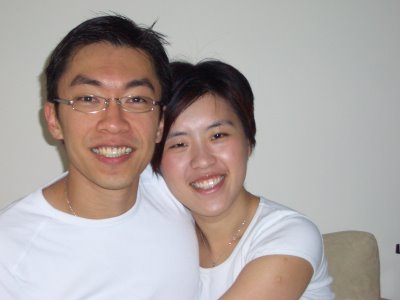This should be an uplifting post to distract the Singaporean blogosphere from the hoo-ha over pay increase for political leaders and civil servants. I was already in some kind of twilight zone when I wrote this post, caught between sleep deprivation of the past 48 hours and the adrenalin still rushing inside. But I was certain that this story was worth another few minutes of my sleep, and it would not be the same if I had waited another day to post this.
A Surprise and Lots of Anxiety
Sometime on Tuesday afternoon, in the middle of a conference in Nottingham University, I received a phone call from my wife Grace in London that the hospital was expecting an early delivery of our first child (a girl) due to some complications. Needless to say, I rushed to the train station to catch the first train back to London. As I had bought a restricted ticket to save on travelling cost, I was not supposed to be on this particular train, and a heavy fine was in fact waiting for me as the train pulled out from Nottingham station. But when I explained to the conductor that my wife was about to give birth in London, all she did was to smile at me and say, congratulations.
National Health Service
To spare the unnecessary details, Grace was checked into St Mary's hospital near Paddington. For those of you who do not already know, the National Health Service (NHS) in Britain is a taxpayer funded health service that provides healthcare free of charge. It is a colossal institution which employs, according to Wikipedia, 1.3 million people thereby making it the fourth largest employer in the world.
As an economist, I can only imagine the kind of waste, fraud, moral hazard and incentive problems that would naturally arise when any good or service, let alone one that is as important and yet ridden with information asymmetry as healthcare, is delivered free.
Every year, NHS lunges from crisis to crisis despite sucking up a vast amount of taxpayers' money. As we were waiting for the delivery, Grace and I had the chance to chat with a young English trainee doctor Hannah. This young doctor was obviously savvy enough to understand that NHS policies presented great financial stress for her country, but she was adamant that the ideal of universal healthcare provision was one that was worth fighting for.
Bleeding Heart Socialism
Take away my economist hat for the moment. As a patient and father-to-be, I begin to realise how wonderful a country Britain is. For all the problems facing Britain over the years, they have steadfastly held on to this uncompromising bleeding heart principle that everyone in this country should receive free healthcare as a fundamental human right. Since this is an unalienable human right, NHS coverage therefore extends even to all foreigners in this country. It is a case of principle over financial considerations to the point of what appears to be fiscal foolishness.
Grace and I are but foreigners in this country - we are neither citizens or permanent residents. We have no long term stake in this country. Yet, we were provided with what was in our opinion the best treatment money could not buy - a bunch of dedicated professionals* working to ensure the safe delivery of our child without us ever having to worry about the cost. As even the most complicated procedures would be free, it relieved us from any financial worries. In the time we have been in Britain, NHS has always taken care of us.
A Singaporean girl Elena Thia was born on the 28 March 2200 hours (British daylight saving time) at St Mary's hospital. Elena was truly born free, courtesy of Britain's generosity. For that, our small family would always remain grateful to this country.
*As far as I can remember: Two midwives, an English and an Ethopian. Anesthetists from India and Hong Kong. Doctors from Malaysia, Greece and UK. Nurses from Ghana. Talk about globalisation!
I am going to bed now . . .
Trivial Updates:
(1) Incidentally, the doctor who delivered Elena (pronounced as eh-LAYN-ah) was from Greece, her name - Eleni. They both share the same root name, which is Helen.
(2) Elena's birth was recorded at 2153 hours (DST), 28 March 2007. If she were born in Singapore, she would have the same birthday as her grandmother 29 March since Singapore is 7 hours ahead. Weight was 2480 grams. Go buy 4-D?
(3) Elena was registered as Elena Paul Thia on the 2 April 2007 at Westminster Council House at Marylebone. Paul is the name of the granddaddy (Grace's father).



